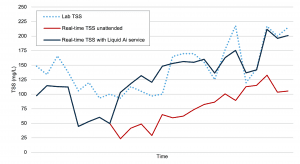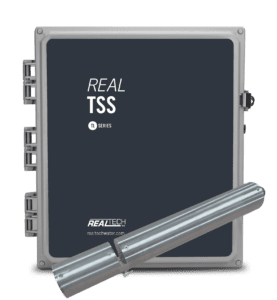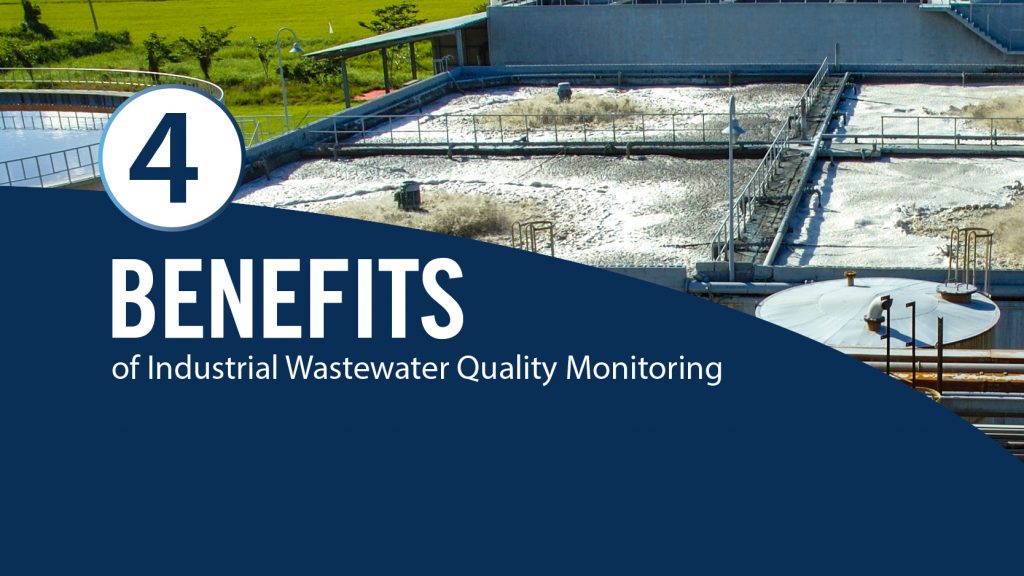Total Suspended Solids (TSS) is a measurement of the total solids in a water or wastewater sample that are retained by filtration. TSS can be measured in real-time with our TSS probe to improve wastewater process control and plant efficiency.
HOW TO MEASURE TSS IN REAL-TIME
To measure TSS in real-time, Real Tech’s innovative TSS sensors utilize near infrared (NIR) light as measurement in this region minimizes or eliminates interference from other absorbing compounds, improving accuracy and reliability of results. The sensors benefit from LED technology, requiring minimal maintenance or operator intervention for continuous TSS monitoring in wastewater.
To ensure the results are as accurate and predictive of the lab as possible, our Liquid Ai® data analytics services provide ongoing calibration health monitoring. The service enables continuous calibration improvements to be made as water quality composition changes or new contaminants are introduced.
We ensure reliability and trust in the results, so our clients can make confident, informed decisions to improve their plants processes. The longer our systems are installed, the smarter and more insightful they become with our Liquid Ai® service.
WHY IS IT IMPORTANT?
TSS is an important water quality parameter measure for wastewater treatment operations and environmental health. Wastewater contains large quantities of suspended organic and inorganic material that must be removed through screening, filtration or settling/flotation methods prior to environmental discharge. TSS will also have adverse affects on UV disinfection blocking/scattering UV light bound for pathogen disinfection or alternatively requiring higher intensity for proper disinfection, increasing energy costs.
If TSS is not removed properly through treatment, high concentrations can lower the water quality in the receiving environment. The suspended solids absorb light, causing increased water temperature and decreased oxygen which creates an unfavorable environment for aquatic life. For this reason, total suspended solids effluent levels are often regulated for wastewater treatment plants discharging to the environment, such as NPDES permits. It is also advantageous to monitor TSS in conjunction with BOD and COD as part of the BOD/COD is in the TSS form.
BENEFICIAL APPLICATIONS FOR TSS MONITORING
Real-time TSS monitoring is valuable for many applications, and it’s no surprise as the alternative is a laboratory test that requires at least 1 hour to produce results.
Continuous organics monitoring opens the door for many new treatment process control and optimization possibilities that can result in significant cost savings, improved water quality, and compliance peace of mind.
Wastewater applications for online TSS measurement include:
LABORATORY DELAY FOR TSS RESULTS LIMITS ACTION
A common method for Total Suspended Solids analysis requires pouring a measure volume of sample water through a pre-weighted filter. The filter is then dried for approximately 1 hour before weighing the filter again.
The concentration of TSS is calculated using the difference in filter weights and the volume of water filtered, commonly expressed in mg/L.
Relying on grab samples leads to significant delays. When results come back from the lab, the information is usually of little value for process control and improving plant performance.
Plants need a practical solution that delivers continuous information on wastewater composition and quality to operations personnel. Real Tech has the solutions to help our clients get the information they need, when they need it.
Real-time TSS monitoring solutions for wastewater.



